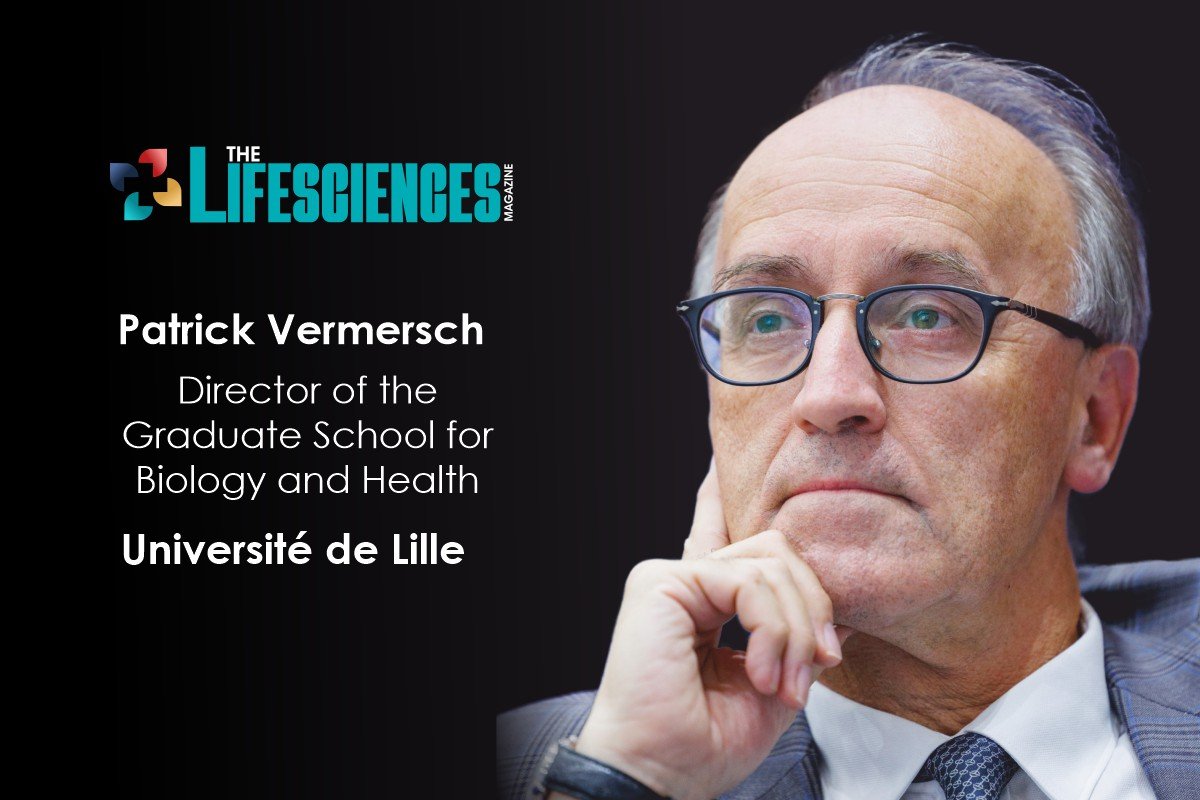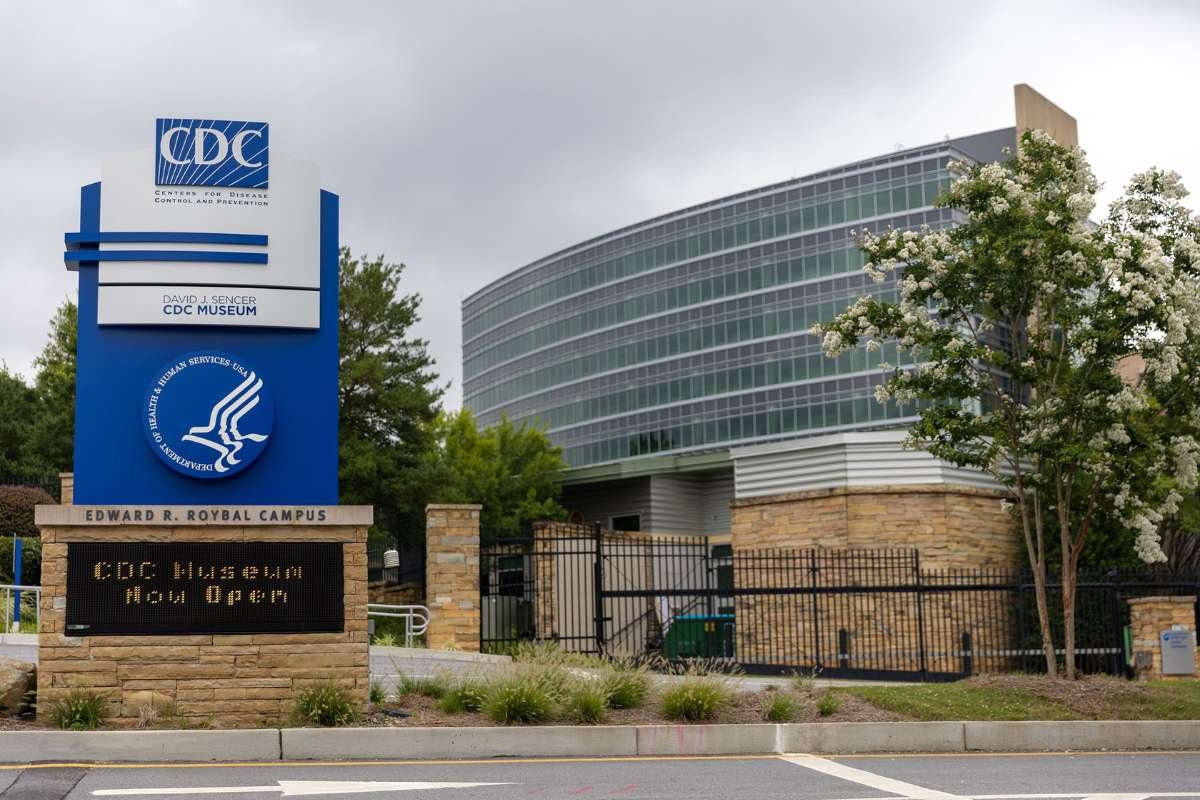The field of neurology has seen significant advancements, particularly in the diagnosis and treatment of neurodegenerative diseases like Multiple Sclerosis (MS), Alzheimer’s, and Parkinson’s. As technology and research have progressed, professionals in the field have taken on important roles in driving innovation, including leading research, developing personalized treatments, overseeing clinical trials, and collaborating globally. These efforts are reshaping the future of neurology, improving patient care, and transforming disease understanding and treatment. The integration of artificial intelligence and precision medicine has made neurology research more interconnected and focused on patient-centered approaches.
Patrick Vermersch, Director of the Graduate School for Biology and Health at the University of Lille, has been instrumental in the institution’s neurology advancements. He has led significant research in Multiple Sclerosis, particularly in biomarkers, disease-modifying treatments, and neuroinflammation. Patrick Vermersch co-founded the PARCSeP network in northern France, enhancing care for MS and Parkinson’s patients. His work in clinical trials, especially with Bruton’s Tyrosine Kinase (BTK) inhibitors and masitinib, is opening new avenues for treating progressive MS. Under his leadership, the University of Lille has made significant progress in neurology, setting a strong foundation for future research and innovation.
A Vision for Science
Patrick Vermersch has held several administrative roles at the University of Lille, including Vice-Dean for Research at the Faculty of Medicine, Vice-President for Research in Biology and Health, and currently, Director of the Graduate School for Biology and Health. These positions have allowed him to contribute to the organization of research at the university and support students, while also broadening his perspective on developing his research. He believes that a scientist must have a wide-ranging understanding of science and beyond. His roles as a board member of the European Charcot Foundation and co-founder of the ParadigMS Foundation have also helped foster collaborations in research and education.
Advancing Patient-Centered Care for MS and Parkinson’s
The creation of the network is something Patrick Vermersch is especially proud of. Together with Professor Patrick Hautecoeur, other colleagues, and Mrs. Sylvie Lemaire, he helped establish the Group for the Care and Study of Multiple Sclerosis (GSEP), initially focused solely on MS patients, which later became known as PARCSeP to include MS and Parkinson’s patients. The network was designed to improve the care approach for these diseases, addressing the global and multidimensional needs of patients. Focusing on patient-centered care has significantly enhanced treatment strategies and outcomes.
Building on these advancements, Patrick’s current research aims to further personalize MS treatment by investigating prognostic markers. By using early intensive treatments more frequently, the goal is to better evaluate the benefit-risk ratio for each patient. In the years ahead, improvements in sequencing and the combination of treatments are expected to further refine MS treatment and diagnosis. Parallel to this, clinical trials have shown promising results, with masitinib and tolebrutinib achieving positive outcomes in non-relapsing forms of progressive MS.
While further research is needed to identify which patient groups benefit most from this treatment, the ongoing extension phase will provide more insight into its long-term benefits. Additionally, the Perseus trial, focusing on tolebrutinib for primary progressive MS, is underway, with results expected in June 2025. Early data on other BTK inhibitors, such as fenebrutinib, are also promising, and ongoing trials of masitinib and frexalimab continue to explore their potential in treating progressive MS. These efforts, along with the development of CAR-T cell therapies, are paving the way for innovative, personalized approaches to MS treatment.
Establishing a Specialized MS Care Unit
In the late 1990s, a consensus was reached at the University of Lille and the University Hospital of Lille to establish a specialized unit dedicated to the care of MS patients. Around the same time, research in the field of MS began with the collaboration of colleagues like Lionel Prin, a Professor of Immunology, and Jean-Pierre Pruvo, a Professor of Neuroradiology. Professor Didier Leys also played a crucial role in helping the researcher realize the potential for significant contributions to high-level research.
From 1995 to 2004, the team made substantial contributions to understanding clinical aspects of MS, particularly in areas such as cognition, visual symptoms, and distinguishing MS from other similar conditions like Sjögren syndrome and Devic Disease. The next phase, from 2005 to 2012, focused on biomarkers utilizing brain imaging and biological markers. This research led to important findings about changes in humoral immunity that occur early in MS. In the most recent period, the work expanded to include major contributions to the development of various treatments, including symptomatic treatments and disease-modifying drugs. Recently, there has been a shift toward advancing patient-related outcomes.
Early Research on Tau Proteins and Neurodegenerative Diseases
In the 1990s, Patrick’s early research focused on Alzheimer’s disease and other neurodegenerative conditions. His work with André Dealcourte’s team looked at the phosphorylation of Tau proteins, identifying different patterns across diseases such as progressive supranuclear palsy and myotonic dystrophy, as well as studying the distribution of abnormal Tau in normal aging. His team also discovered the unexpected presence of phosphorylated Tau proteins in the cortex of patients with Parkinson’s disease.
Later, In the team lead by Lennart Mars in the research unit (Director: Luc Buée), his research shifted to therapeutic studies, including evaluating drugs in phase 2 and 3 trials.
Key highlights of this work include:
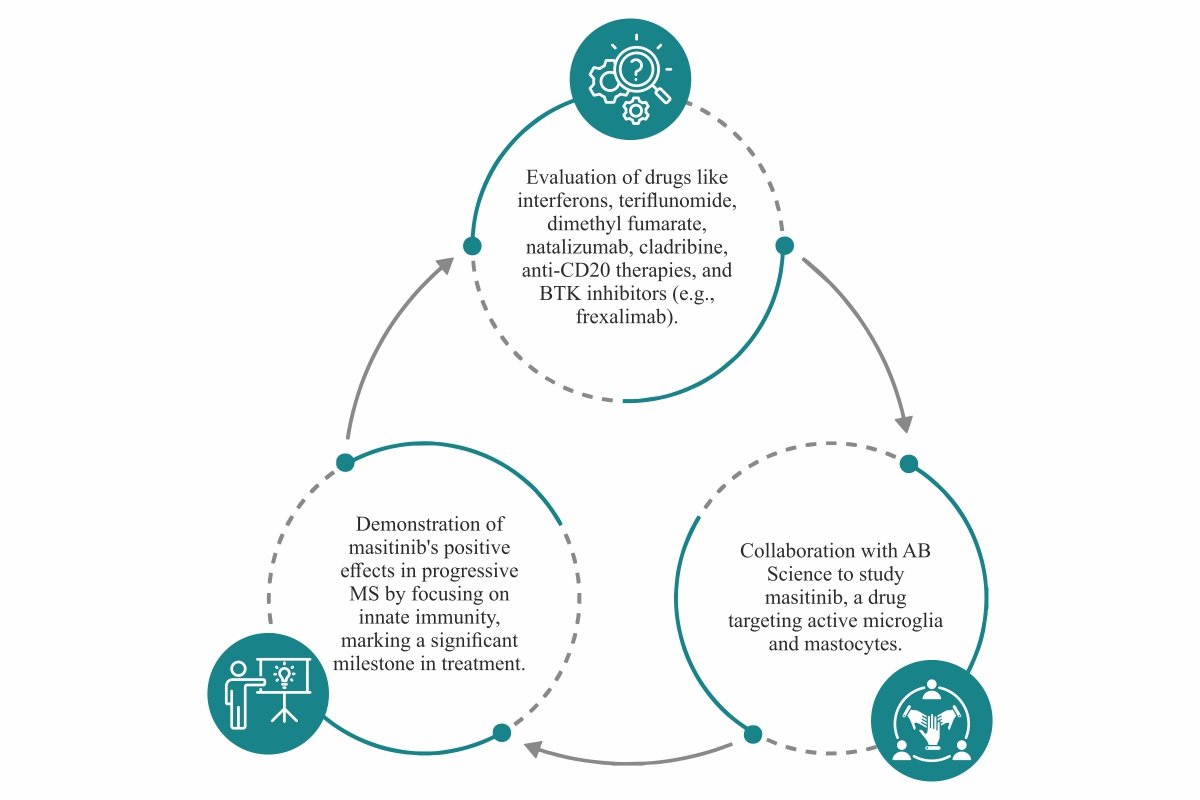
- Evaluation of drugs like interferons, teriflunomide, dimethyl fumarate, natalizumab, cladribine, anti-CD20 therapies, and BTK inhibitors (e.g., frexalimab).
- Collaboration with AB Science to study masitinib, a drug targeting active microglia and mastocytes.
- Demonstration of masitinib’s positive effects in progressive MS by focusing on innate immunity, marking a significant milestone in treatment.
Tackling Fatigue and Urinary Disturbances in MS
The team at the University of Lille is focused on optimizing current treatments for patients, including those with urinary disturbances, while also exploring new treatments for fatigue, one of the most disabling symptoms for many. Their research into disease-modifying drugs continues, with key efforts in the development of BTK inhibitors.
Notable highlights include:
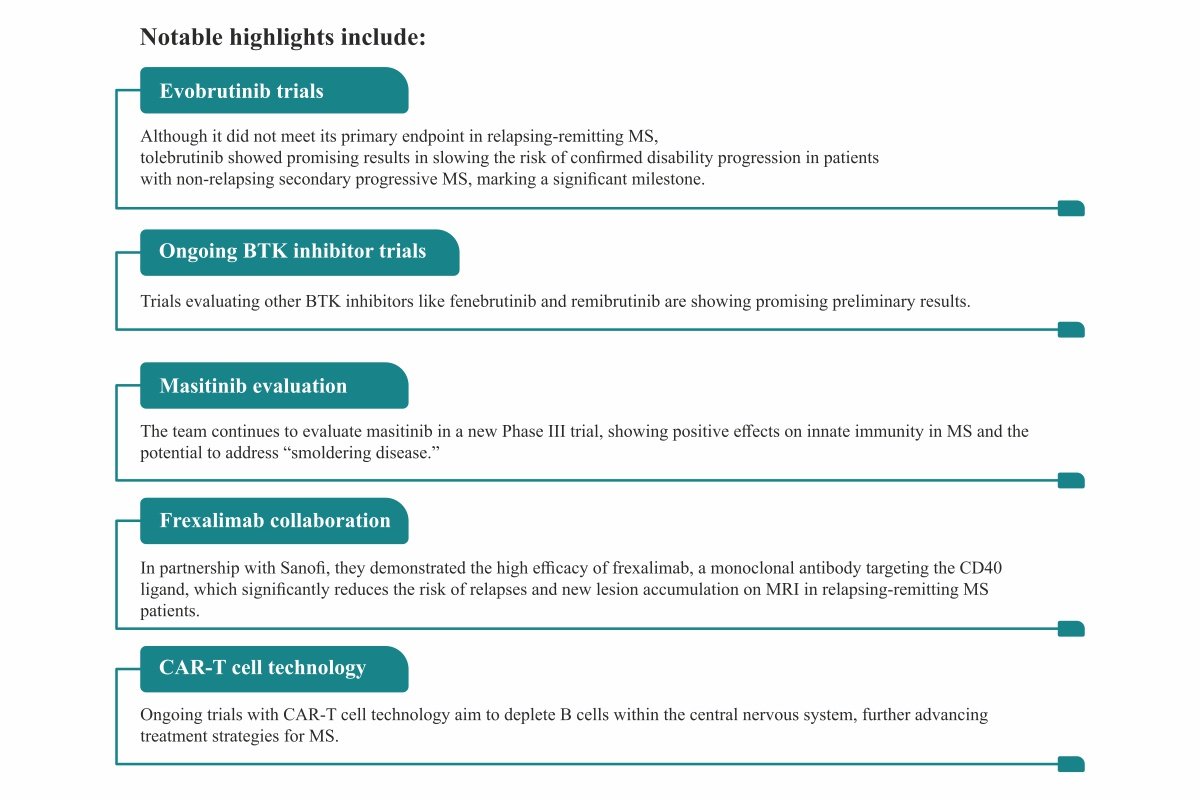
- Evobrutinib trials: Although it did not meet its primary endpoint in relapsing-remitting MS, tolebrutinib showed promising results in slowing the risk of confirmed disability progression in patients with non-relapsing secondary progressive MS, marking a significant milestone.
- Ongoing BTK inhibitor trials: Trials evaluating other BTK inhibitors like fenebrutinib and remibrutinib are showing promising preliminary results.
- Masitinib evaluation: The team continues to evaluate masitinib in a new Phase III trial, showing positive effects on innate immunity in MS and the potential to address “smoldering disease.”
- Frexalimab collaboration: In partnership with Sanofi, they demonstrated the high efficacy of frexalimab, a monoclonal antibody targeting the CD40 ligand, which significantly reduces the risk of relapses and new lesion accumulation on MRI in relapsing-remitting MS patients.
- CAR-T cell technology: Ongoing trials with CAR-T cell technology aim to deplete B cells within the central nervous system, further advancing treatment strategies for MS.
Role of Neuroinflammation in Neurodegenerative Diseases
Neuroinflammation plays a significant role in neurodegenerative disorders such as ALS, Parkinson’s, and Alzheimer’s diseases. Recent research highlights the potential benefits of targeting neuroinflammation, particularly by reducing the activity of microglial cells. These cells’ pro-inflammatory activity can act as a catalyst in the neurodegenerative process, suggesting that addressing their harmful roles, along with those of astrocytes, could be crucial in managing these conditions.
Alongside understanding the cellular mechanisms, improving the detection of subtle changes in patients is key for clinical practice and research. Biomarkers, in particular, are becoming essential tools in this effort. Advanced MRI techniques, such as susceptibility imaging, are now being used to detect paramagnetic rim lesions, which have been linked to a higher risk of disability progression. This insight can guide treatment decisions.
Additionally, MRI is showing promise in detecting inflammation in the leptomeninges, and recent data on biomarkers like Neurofilament Light Chain (NfL) and Glial Fibrillary Acidic Protein (GFAP) suggest they could become valuable for monitoring disease progression. Moreover, PET imaging with specific ligands is increasingly used in research to identify heightened microglial activity, offering the potential for optimizing patient follow-up and treatment strategies.
The Role of ERC Funding
The European Research Council (ERC) plays a pivotal role in advancing neurology research by providing critical funding through programs like the Starting, Consolidator, and Advanced grants, along with the Innovative Health Initiative (IHI). These grants are instrumental in supporting ambitious projects that drive innovation in the field. Complementing this, scientific societies like the European Academy of Neurology and specialized organizations such as the European Charcot Foundation bring researchers together to collaborate effectively.
Building on these funding and collaborative efforts, many countries are working to establish large, diverse patient cohorts for neurological diseases. By connecting these groups internationally, researchers can share data and insights more effectively. For Multiple Sclerosis (MS), initiatives like the MS Data Alliance and the CLAIMS project are setting benchmarks in utilizing AI and precision medicine to deepen our understanding of these diseases and enhance treatment outcomes.
Balancing Human-Centered Care and Technological Advancements
In the field of neuroscience, two key aspects must be considered together. First is the human aspect, which includes clinical practice and ethics. A patient-centered approach is essential in education and training. The second aspect is the incorporation of new technologies, such as neuroimaging, genomics, and artificial intelligence, which are changing the field by enabling more precise and effective treatments.
Looking ahead, a common feature of many neurodegenerative diseases is neuronal death. The next breakthrough in neuroscience will be gaining a deeper understanding of how neuronal injury happens and developing neuroprotective drugs that can help preserve and repair nerve cells. The combination of human-centered care and advanced technology will be crucial for advancing the understanding and treatment of these challenging conditions.
Interdisciplinary Collaboration
The University of Lille fosters a positive environment with strong connections to the University Hospital, creating an ideal setting for clinical and translational research. The research unit, recognized by INSERM, brings together teams with complementary approaches, supporting basic and applied research. Shortly, the addition of a 7T MRI machine will enhance neuroimaging capabilities, playing a crucial role in advancing research programs in neurosciences.
5 Business Mantras from Patrick Vermersch
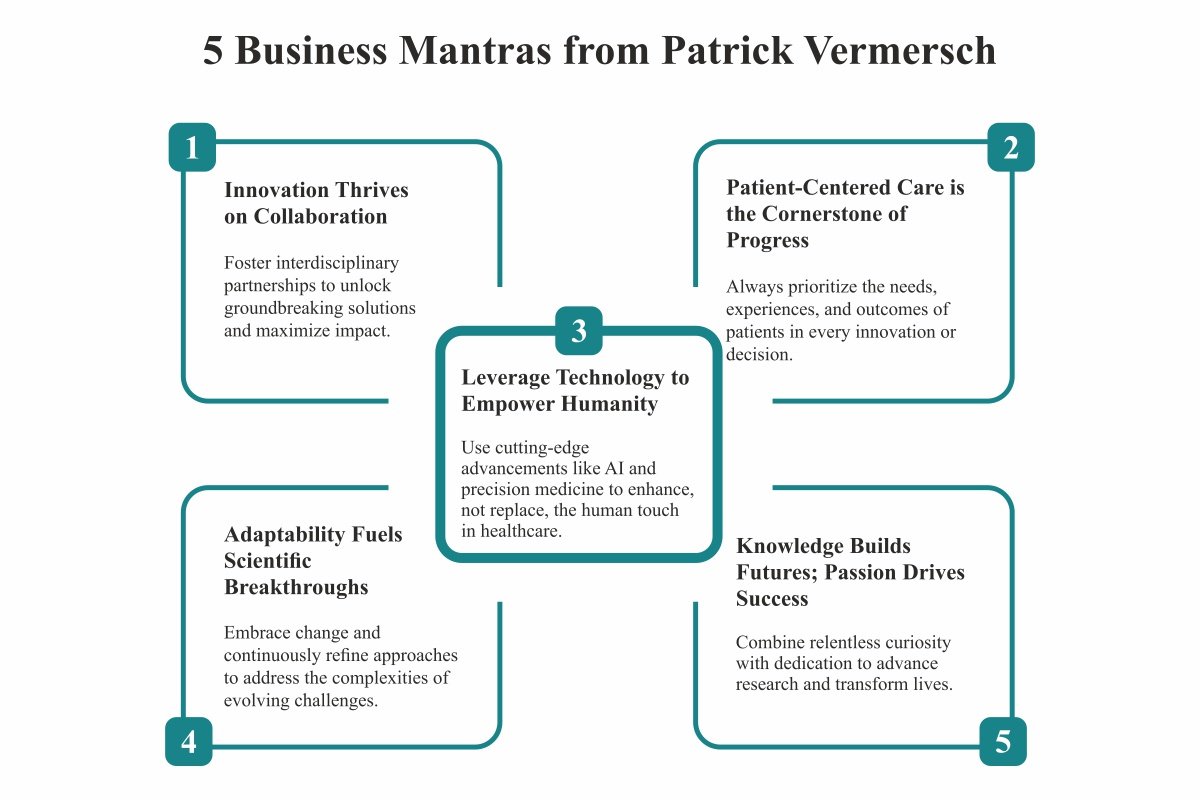
- Innovation Thrives on Collaboration: Foster interdisciplinary partnerships to unlock groundbreaking solutions and maximize impact.
- Patient-Centered Care is the Cornerstone of Progress: Always prioritize the needs, experiences, and outcomes of patients in every innovation or decision.
- Leverage Technology to Empower Humanity: Use cutting-edge advancements like AI and precision medicine to enhance, not replace, the human touch in healthcare.
- Adaptability Fuels Scientific Breakthroughs: Embrace change and continuously refine approaches to address the complexities of evolving challenges.
- Knowledge Builds Futures; Passion Drives Success: Combine relentless curiosity with dedication to advance research and transform lives.
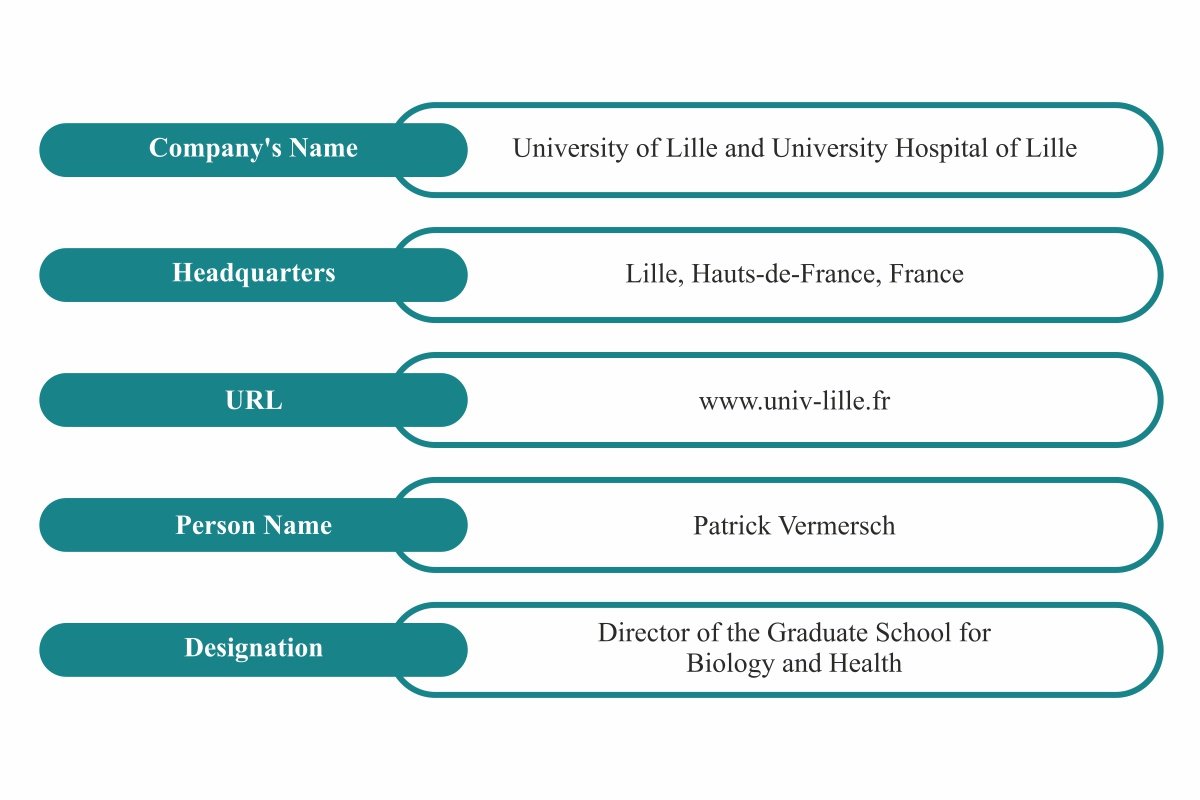
| Company’s Name: University of Lille and University Hospital of Lille Headquarters: Lille, Hauts-de-France, France URL: https://www.univ-lille.fr/ Person Name: Patrick Vermersch Designation: Director of the Graduate School for Biology and Health |

